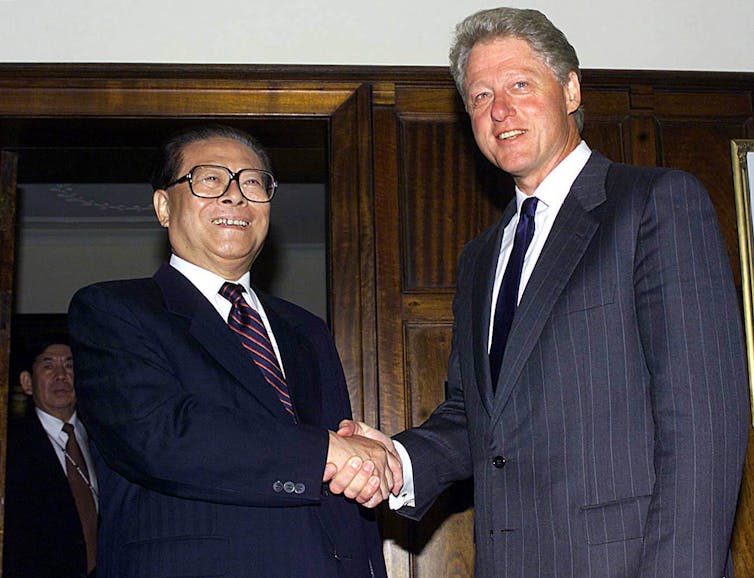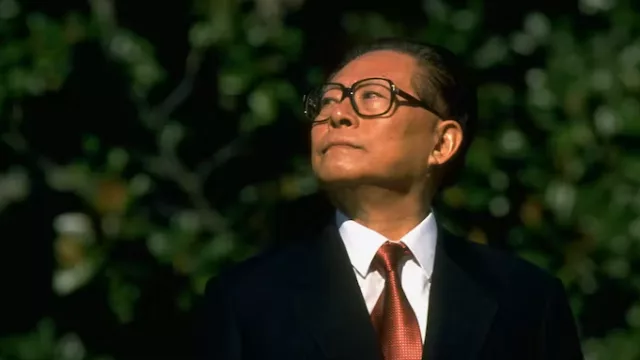That transition came thanks in no small part to an underestimated, Soviet-trained electrical engineer – former Chinese President Jiang Zemin, who died on Nov. 30, 2022, at the age of 96.
I first traveled to and studied in China in 1992. At that time, the still powerful former leader Deng Xiaoping was publicly criticizing Jiang’s more conservative approach to the economy in a series of visits and talks he gave during what became known as Deng’s “Southern Tour.” Eventually Jiang fell in line and supported Deng’s liberalization measures and the idea of economic transformation. Yet while Jiang’s subsequent policies laid a strong foundation for China’s growth, they also likely sowed the seeds of excess that set the stage for current President Xi Jinping’s rise.
The grand experiment
Jiang was picked to lead the country as general secretary in June 1989, after the ouster of former leader Zhao Ziyang for Zhao’s conciliatory approach towards the Tiananmen Square protesters.
Within three years Jiang embarked on a grand experiment together with Deng and then-Vice Premier Zhu Rongji, which required Jiang to do what others had been unable or unwilling to do: force the restructuring of inefficient state-owned enterprises in a wide range of sectors. This resulted in the laying off of millions of workers who had expected such jobs to be lifelong “iron rice bowls.”
From 1998 to 2002, approximately 34 million people were fired as China privatized hundreds of state-owned enterprises and shuttered thousands more.
This concerted effort proved an important and necessary step toward preparing Chinese companies for more direct market competition and integration with the world economy by the turn of the century.
Ascending on the world stage
Jiang’s real influence began upon Deng’s death in February 1997.
In July of that year, he presided over the handover of Hong Kong to the mainland. He then proved an able leader during the macroeconomic storm of the Asian financial crisis that began that same month. China quickly recovered and by 2001 had both acceded to the World Trade Organization and won the bid to host the 2008 Summer Olympic Games.

By 2002 China’s economy had grown to represent over 4% of the global economy. Jiang sought to reinforce such economic dynamism through more formal means, and revised the constitution that same year to formally allow corporate elite and private business entrepreneurs into the Chinese Communist Party.
Growing inequality
This economic liberalization was paired with housing privatization policies. Combined, they spurred the creation of a burgeoning middle class and large-scale private wealth generation.
What was missing, though, was adequate regulation to provide a check on the often-wild results of unbridled growth. Economic inequalities grew dramatically in the 1990s and on through 2005, when Jiang formally relinquished his final title as the head of the military.
This created large social fissures, as rampant corruption began to permeate central and local governments, crime rates rose, and even the military itself got into business schemes. Local governments resorted to rafts of arbitrary and extra-budgetary fees levied on citizens to pay for critical public goods and services, as well as infrastructure, which had eroded over time.
Return of the state
Jiang’s successors needed to respond to the problems his policies created. They did so by elevating the role of the state in social and economic life, promoting what they described as a more “balanced development” model.
Hu Jintao, who succeeded Jiang, focused resources and policy priorities on transferring more resources to the poorer regions of China, shoring up a weak medical and social insurance system and promulgating more egalitarian measures as part of a “putting people first” program. In just five years, the percentage of China’s population covered by health insurance more than doubled, from 43% in 2006 to 95% in 2011.
Hu also moderated Jiang’s growth at any cost focus, pushing through policies that provided assistance to groups who had not benefited as much from China’s economic reforms, such as migrants, the rural poor and laid-off urban workers.
Xi has provided a more pointed response to what he likely views as the costs of Jiang’s governance. While continuing the shift toward greater centralization, he has deepened and widened the state’s role in not only the economy but other spheres of Chinese life, such as society and the military.
A smooth transition?
But Jiang’s legacy is more than just soaring economic growth and staggering inequality. It is also important to note that the end of his leadership marked China’s first orderly transition of political power since the founding of the People’s Republic of China in 1949.
That precedent was, and continues to be, important. While he initially maintained some influence for several years after formally stepping down as general secretary, Jiang’s most singular legacy may be showing the world – and the Chinese people – that smooth transitions of power were indeed possible. Whether they still are possible remains an open question.
Edward Cunningham, Director of Ash Center China Programs, Harvard Kennedy School
This article is republished from The Conversation under a Creative Commons license. Read the original article.
![]()












Tu opinión enriquece este artículo: